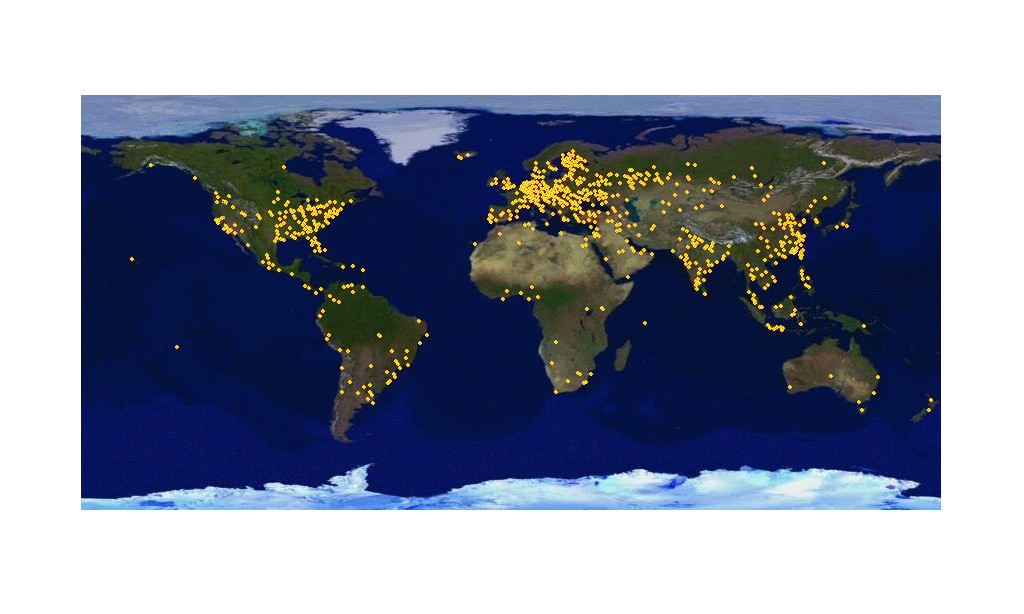This image is the site’s visitor map for early February 2015. It’s nice to look at. Not so much because it shows how many visitors are visiting the site, but because it shows so clearly that we are in the same boat.
In the 2012 Online Movie, there is a clip in which Ian Xel Lungold very clearly lays out the basis of the Mayan calendar and the Mayan predictions about the evolution of consciousness. From the perspective of modern civilisation, the evolution of consciousness began when apes evolved family consciousness 41 million years ago. This was followed by tribal consciousness, cultural consciousness, nationality consciousness, etc. The presentation of the evolution of consciousness shows how, over time, we have begun to emphasize our own reference group (at the expense of others).
What is remarkable about the evolution of consciousness is that it accelerates towards the end. Over millennia and centuries, the creation that has taken place during previous evolutionary periods has required a shorter time for future generations. We are now at a stage where the pace of change has accelerated to an extreme: creation, which took 20 years before 1999, now takes just one year. During the period of Universal Consciousness, which according to the Mayan calendar began on 10 February 2011, the year has turned into 20 days. Hardly even the world’s leading politicians can keep up with the changes any more.
People living at the level of ego consciousness are desperately trying to fit the world of today into the systems of the old world. Some politicians believe that democracy works against itself by allowing people to act freely according to their inner impulses. They want to put an end to ‘hate speech’ and acts of terrorism by restricting freedoms (especially freedom of expression) and regulating the internet, even though they know that the internet guarantees democratic participation.
Freedom of speech does not cover only information and ideas that will be sympathetic, which are considered to be harmless or which are looked upon with indifference. Freedom of expression also covers messages that offend, shock or disturb the state or any of its part of the population. Such are the demands of pluralism, tolerance and broad mindedness without which there is no democratic society.
The European Court of Human Rights
A friend of mine came to me shortly after the anti-terrorist demonstrations in Paris and said, with anguish, that anyone can come across extremist Islamic opinions on internet discussion forums these days. He did not understand that anyone could think like these people and wondered why they were not arrested but were free to express their opinions.
This comes from a man who values his own freedom. But no one who has lived in a free democracy wants his or her freedoms to be restricted.
I myself got my first decent internet connection in 1999, after which I was able to participate freely in online discussions. The first few years were a real period of spiritual growth for me as I assimilated into the new internet culture. I realised what an illusory world I had been living in before.
The discussions sometimes gave me a feeling of immense anxiety and it was incomprehensible how someone could think the way many people thought. I often felt that my own quality of life suffered when I read the opinions of anonymous authors: opinions often caused a shocking emotional reaction in me, which made my hair stand on end and the anxiety sometimes lasted for days. On the other hand, I felt that people became closer to me, because I believed that the opinions of the anonymous people I read online represented the group of people with whom I was in contact when I took care of things in public.
Despite my distressing experiences, I am now even glad I had to go through them, as they helped me in my own spiritual growth. Nowadays, when I read opinions that differ significantly from my own, they flow like water off a goose’s back. Not because I don’t care what others think, but because I don’t see people as targets to whom I should impose my opinions and who I should make think as I think. The only thing I can do is to honestly describe my own reality and why I think the way I do.
Other people are like me: independent thinkers, more or less susceptible to manipulation, with their own path to follow. If they think about things in a completely different way than I do, it just means that our level of consciousness is different. It’s not about right and wrong, it’s about both listening to their inner voice and being honest with themselves. What is certain is that everyone at some point has to face the realities of life and carefully weigh up which way to go. It is important that this process of development is allowed to proceed freely on its own terms.
In my opinion, hate speech and acts of terrorism do not require any special measures. This is because our shared universal consciousness is holographic in nature. Gregg Braden uses Mandelbrot’s fractal in the 2012 Online Movie (at 2:20:34-2:27:10) to illustrate what this means in practice: each and every one of us influences our collective consciousness with our attitudes, actions and emotions. We can practically lighten each other’s burdens by meditating or praying for each other. The important thing is not to poison our collective consciousness with feelings of anger and fear, which have a low and slow vibrational frequency. They have a negative impact on our physical being, reducing our ability to engage in constructive cooperation with others.
Read also:
- Ian Xel Lungold: mayanmajix.com
- Waking Times: Thinking – A Criminal Act?
- Fractal Foundation: What is Chaos Theory?
- Wikipedia: Mandelbrot set
- Wikimedia: Wolfgang Beyer (Mandelbrot-fractals)

